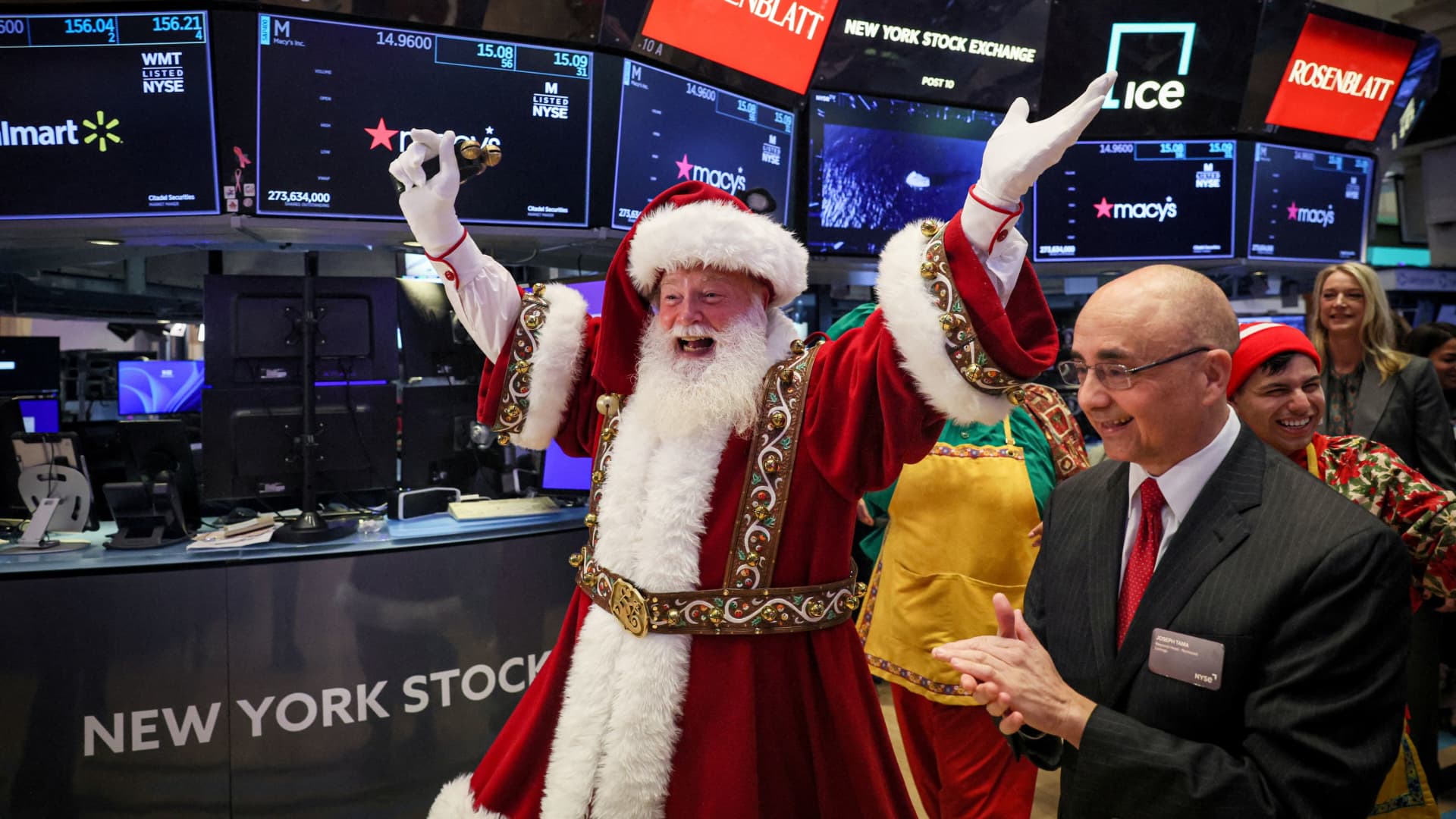Reuters
Goldilocks meets Santa as global stocks power to best month in three years
C.Thompson3 months ago
Best month for world stocks in 3 years ICE BofA index of IG bonds set for best month on record Equity investors pin hopes on soft landing for world economy LONDON, Nov 30 (Reuters) - November has shaped up to be a fairytale month for equities, with the festive Santa rally investors traditionally hope for coming early as traders bet on a Goldilocks scenario of inflation falling and central banks lowering interest rates. MSCI's world stock index (.MIWO00000PUS) is set to close the month up around 9%, its best performance since November 2020, when markets cheered the arrival of COVID-19 vaccines. Easing inflation has boosted talk that the U.S. Federal Reserve, the European Central Bank and others are done with aggressive rate hikes, lifting bond and stocks while hurting the dollar. Global bond prices have soared, with an ICE BofA index of global investment-grade bonds in major markets set to return 3.4% in November, the best month on record going back to 1997. (.MERGBMI) . Yields on U.S. Treasuries, which move in the opposite direction to prices, are set for the biggest monthly drop since 2008. That's taken the sting out of a summer bond rout , while major stock markets are on track to reverse 2023's sharp falls. But there's a caveat, warn investors, cautioning that equities could be ignoring the recession risks that typically bode well for safe-haven government debt. "The equity market is too optimistic right now and bond markets have it right," said Altaf Kassam, head of investment strategy and research, EMEA, for State Street Global Advisors. "There is still room for interest rates to come down and disinflation to continue but we think for that to happen growth will also slow down and the lagged effect of monetary tightening will come." BROAD BASED November's equity rally has been broad based, with Wall Street's S&P 500 (.SPX) 8.6% higher on the month and Europe's Stoxx 600 index (.STOXX) adding 6%. Global growth stocks in high-tech sectors are up 11% (.dMIWO0000GNUS) while value stocks, which are mainly in cyclical industries and offer high dividends, have gained 6.5% (.dMIWO0000VNUS) . Major central banks have jacked up rates by a hefty 3,965 bps since late 2021 and investors sense a peak has been reached. Traders are already pricing roughly 100 bps of Fed and ECB rate cuts next year while most big economies have paused rate rises to see how much the tightening bites. "We've now had this rebound (in equities) and what we need to see is tangible supporting evidence that this is not a head fake policy pivot," said Zurich Insurance Group chief market strategist Guy Miller. Joost Van Leenders, senior investment strategist at Dutch bank Van Lanschot Kempen, said he expected U.S. and European equities to fall from here as monetary tightening impacts the economy. U.S. home sales slumped to a 13-year low in October, euro zone bank lending to businesses fell by the first time since 2015 last month as a recession in the bloc looms, while China's economic performance remains weak. Equity markets are also ignoring the downside of lower inflation, Van Leenders said, because companies that have passed on higher prices to customers have achieved higher nominal growth in revenues and profits. "It's all the more difficult (for company earnings) when inflation is falling," he said. And a cloudier outlook for stocks suggests a divergence could open up between again between stocks and bonds. Until recently eyeing a third year of straight losses, November's rally means government bonds have eked out a 0.7% positive annual return. (.MERW0G1) . The broader global index is set to return 1.6% for the year. Asset managers had expected a good year for bonds, a scenario that failed to materialise as rates rose further and government and consumer spending buoyed the U.S. economy.
BROAD BASED November's equity rally has been broad based, with Wall Street's S&P 500 (.SPX) 8.6% higher on the month and Europe's Stoxx 600 index (.STOXX) adding 6%. Global growth stocks in high-tech sectors are up 11% (.dMIWO0000GNUS) while value stocks, which are mainly in cyclical industries and offer high dividends, have gained 6.5% (.dMIWO0000VNUS) . Major central banks have jacked up rates by a hefty 3,965 bps since late 2021 and investors sense a peak has been reached. Traders are already pricing roughly 100 bps of Fed and ECB rate cuts next year while most big economies have paused rate rises to see how much the tightening bites. "We've now had this rebound (in equities) and what we need to see is tangible supporting evidence that this is not a head fake policy pivot," said Zurich Insurance Group chief market strategist Guy Miller. Joost Van Leenders, senior investment strategist at Dutch bank Van Lanschot Kempen, said he expected U.S. and European equities to fall from here as monetary tightening impacts the economy. U.S. home sales slumped to a 13-year low in October, euro zone bank lending to businesses fell by the first time since 2015 last month as a recession in the bloc looms, while China's economic performance remains weak. Equity markets are also ignoring the downside of lower inflation, Van Leenders said, because companies that have passed on higher prices to customers have achieved higher nominal growth in revenues and profits. "It's all the more difficult (for company earnings) when inflation is falling," he said. And a cloudier outlook for stocks suggests a divergence could open up between again between stocks and bonds. Until recently eyeing a third year of straight losses, November's rally means government bonds have eked out a 0.7% positive annual return. (.MERW0G1) . The broader global index is set to return 1.6% for the year. Asset managers had expected a good year for bonds, a scenario that failed to materialise as rates rose further and government and consumer spending buoyed the U.S. economy. Van Leenders said he expected further gradual falls for Treasury yields. Ten-year Treasury yields, trading at 4.2%, are down from a peak above 5% hit in October. Germany's benchmark Bund yield too has pulled back from recent highs above 3%. "We're looking for softness in the U.S. next year," State Street's Kassam said. "And on balance we prefer fixed income right now because the lack of growth is what's going to keep equities in check."
Van Leenders said he expected further gradual falls for Treasury yields. Ten-year Treasury yields, trading at 4.2%, are down from a peak above 5% hit in October. Germany's benchmark Bund yield too has pulled back from recent highs above 3%. "We're looking for softness in the U.S. next year," State Street's Kassam said. "And on balance we prefer fixed income right now because the lack of growth is what's going to keep equities in check."


Read the full article:https://www.reuters.com/markets/global-markets-monthend-2023-11-30/
0 Comments
0
/cloudfront-us-east-2.images.arcpublishing.com/reuters/NST4D2USFBISBGDZNR373VEYEI.jpg)






:quality(70)/cloudfront-us-east-1.images.arcpublishing.com/cmg/VHQ6UKNAGVI5XPSPVO7SU5UTLQ.jpg)
/cloudfront-us-east-2.images.arcpublishing.com/reuters/2K5MG2S3UFJOHNIKLKWA57OI2Q.jpg)









